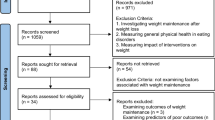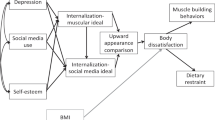Abstract
Depression and low self-efficacy are both associated with worse glycemic control in adults with diabetes, but the relationship between these variables is poorly understood. We conducted a cross-sectional study examining associations between depressive symptoms, self-efficacy, and glycemic control among men (n = 64) and women (n = 98) with type 2 diabetes to see if self-efficacy mediates the relationship between depression and glycemic control. Correlational and mediational analyses examined the relationship between these three variables for the sample as a whole and separately by sex. A significant association between depressive symptoms and glycemic control was found for men (0.34, P < 0.01) but not for women (0.05, P = 0.59). Path analysis suggested that, among men, self-efficacy mediates the relationship between depressive symptoms and glycemic control. We conclude that men with depressive symptoms and type 2 diabetes may need tailored interventions that improve their self-efficacy in order to achieve glycemic control.

Similar content being viewed by others
References
Adriaanse, M. C., Dekker, J. M., Nijpels, G., Heine, R. J., Snoek, F. J., & Pouwer, F. (2006). Associations between depressive symptoms and insulin resistance: the hoorn study. Diabetologia, 49(12), 2874–2877.
Anderson, R. J., Freedland, K. E., Clouse, R. E., & Lustman, P. J. (2001). The prevalence of comorbid depression in adults with diabetes: a meta-analysis. Diabetes Care, 24(6), 1069–1078.
Bandura, A. (Ed.). (1997). Self-efficacy: the exercise of control. New York: Freeman.
Bandura, A. (2004). Health promotion by social cognitive means. Health Education and Behavior, 31(2), 143–164.
Bandura, A., Pastorelli, C., Barbaranelli, C., & Caprara, G. V. (1999). Self-efficacy pathways to childhood depression. Journal of Personality and Social Psychology, 76(2), 258–269.
Buchanan, T., & Selmon, N. (2008). Race and gender differences in self-efficacy: assessing the role of gender role attitudes and family background. Sex Roles, 58, 822–836.
Cavanaugh, K., Huizinga, M. M., Wallston, K. A., Gebretsadik, T., Shintani, A., Davis, D., et al. (2008). Association of numeracy and diabetes control. Annals of Internal Medicine, 148(10), 737–746.
Centers for Disease Control, Prevention. (2008). National diabetes fact sheet: general information and national estimates on diabetes in the United States, 2007. Atlanta, GA: U.S. Department of Health and Human Services, Centers for Disease Control and Prevention.
Chao, J., Nau, D. P., Aikens, J. E., & Taylor, S. D. (2005). The mediating role of health beliefs in the relationship between depressive symptoms and medication adherence in persons with diabetes. Research in Social and Administrative Pharmacy, 1(4), 508–525.
Chapman, D. P., Perry, G. S., & Strine, T. W. (2005). The vital link between chronic disease and depressive disorders. Preventing Chronic Disease, 2(1), A14.
Ciechanowski, P. S., Katon, W. J., Russo, J. E., & Hirsch, I. B. (2003). The relationship of depressive symptoms to symptom reporting, self-care and glucose control in diabetes. General Hospital Psychiatry, 25(4), 246–252.
Cohen, S. T., Welch, G., Jacobson, A. M., De Groot, M., & Samson, J. (1997). The association of lifetime psychiatric illness and increased retinopathy in patients with type I diabetes mellitus. Psychosomatics, 38(2), 98–108.
Coultas, D. B., Edwards, D. W., Barnett, B., & Wludyka, P. (2007). Predictors of depressive symptoms in patients with COPD and health impact. Copd, 4(1), 23–28.
Davis, T. C., Crouch, M. A., Long, S. W., Jackson, R. H., Bates, P., George, R. B., et al. (1991). Rapid assessment of literacy levels of adult primary care patients. Family Medicine, 23(6), 433–435.
de Groot, M., Anderson, R., Freedland, K. E., Clouse, R. E., & Lustman, P. J. (2001). Association of depression and diabetes complications: a meta-analysis. Psychosomatic Medicine, 63(4), 619–630.
DeVellis, B., & DeVellis, R. (2001). Self-efficacy and health. In A. Baum, T. Revenson & J. Singh (Eds.), Handbook of Health Psychology (pp. 235–247).
Fisher, L., Chesla, C. A., Mullan, J. T., Skaff, M. M., & Kanter, R. A. (2001). Contributors to depression in Latino and European-American patients with type 2 diabetes. Diabetes Care, 24(10), 1751–1757.
Glasgow, R. E., Toobert, D. J., Riddle, M., Donnelly, J., Mitchell, D. L., & Calder, D. (1989). Diabetes-specific social learning variables and self-care behaviors among persons with type II diabetes. Health Psychology, 8(3), 285–303.
Glasgow, R. E., Toobert, D. J., Hampson, S. E., & Wilson, W. (1995). Behavioral research on diabetes at the oregon research institute. Annals of Behavioral Medicine, 17, 32–40.
Hanninen, J. A., Takala, J. K., & Keinanen-Kiukaanniemi, S. M. (1999). Depression in subjects with type 2 diabetes. Predictive factors and relation to quality of life. Diabetes Care, 22(6), 997–998.
Huizinga, M. M., Elasy, T. A., Wallston, K. A., Cavanaugh, K., Davis, D., Gregory, R. P., et al. (2008). Development and validation of the diabetes numeracy test (DNT). BMC Health Services Research, 8, 96.
Ikeda, K., Aoki, H., Saito, K., Muramatsu, Y., & Suzuki, T. (2003). Associations of blood glucose control with self-efficacy and rated anxiety/depression in type II diabetes mellitus patients. Psychological Reports, 92(2), 540–544.
Jeffcoate, S. L. (2004). Diabetes control and complications: the role of glycated haemoglobin, 25 years on. Diabetic Medicine, 21(7), 657–665.
Katon, W. J., Rutter, C., Simon, G., Lin, E. H., Ludman, E., Ciechanowski, P., et al. (2005). The association of comorbid depression with mortality in patients with type 2 diabetes. Diabetes Care, 28(11), 2668–2672.
Kavanagh, D. J., Gooley, S., & Wilson, P. H. (1993). Prediction of adherence and control in diabetes. Journal of Behavioral Medicine, 16(5), 509–522.
Krichbaum, K., Aarestad, V., & Buethe, M. (2003). Exploring the connection between self-efficacy and effective diabetes self-management. The Diabetes Educator, 29(4), 653–662.
Legato, M. J., Gelzer, A., Goland, R., Ebner, S. A., Rajan, S., Villagra, V., et al. (2006). Gender-specific care of the patient with diabetes: review and recommendations. Gender Medicine, 3(2), 131–158.
Lloyd, C. E., Dyer, P. H., & Barnett, A. H. (2000). Prevalence of symptoms of depression and anxiety in a diabetes clinic population. Diabetic Medicine, 17(3), 198–202.
Lustman, P. J., Anderson, R. J., Freedland, K. E., de Groot, M., Carney, R. M., & Clouse, R. E. (2000). Depression and poor glycemic control: a meta-analytic review of the literature. Diabetes Care, 23(7), 934–942.
Lustman, P. J., Clouse, R. E., Ciechanowski, P. S., Hirsch, I. B., & Freedland, K. E. (2005). Depression-related hyperglycemia in type 1 diabetes: a mediational approach. Psychosomatic Medicine, 67(2), 195–199.
McCauley Ohannessian, C., Lerner, R. M., Lerner, J. V., & von Eye, A. (1999). Does self-competence predict gender differences in adolescent depression and anxiety? Journal of Adolescence, 22(3), 397–411.
McHale, M., Hendrikz, J., Dann, F., & Kenardy, J. (2008). Screening for depression in patients with diabetes mellitus. Psychosomatic Medicine, 70(8), 869–874.
Musselman, D. L., Betan, E., Larsen, H., & Phillips, L. S. (2003). Relationship of depression to diabetes types 1 and 2: epidemiology, biology, and treatment. Biological Psychiatry, 54(3), 317–329.
Nakahara, R., Yoshiuchi, K., Kumano, H., Hara, Y., Suematsu, H., & Kuboki, T. (2006). Prospective study on influence of psychosocial factors on glycemic control in Japanese patients with type 2 diabetes. Psychosomatics, 47(3), 240–246.
Naqvi, T. Z., Naqvi, S. S., & Merz, C. N. (2005). Gender differences in the link between depression and cardiovascular disease. Psychosomatic Medicine, 67(1), S15–S18.
Narayan, K. M., Boyle, J. P., Thompson, T. J., Sorensen, S. W., & Williamson, D. F. (2003). Lifetime risk for diabetes mellitus in the United States. Journal of the American Medical Association, 290(14), 1884–1890.
Penninx, B. W., van Tilburg, T., Boeke, A. J., Deeg, D. J., Kriegsman, D. M., & van Eijk, J. T. (1998). Effects of social support and personal coping resources on depressive symptoms: different for various chronic diseases? Health Psychology, 17(6), 551–558.
Pilote, L., Dasgupta, K., Guru, V., Humphries, K. H., McGrath, J., Norris, C., et al. (2007). A comprehensive view of sex-specific issues related to cardiovascular disease. Canadian Medical Association Journal, 176(6), S1–S44.
Plante, G. E. (2005). Depression and cardiovascular disease: a reciprocal relationship. Metabolism, 54(5 Suppl 1), 45–48.
Pouwer, F., & Snoek, F. J. (2001). Association between symptoms of depression and glycaemic control may be unstable across gender. Diabetic Medicine, 18(7), 595–598.
Radloff, L. (1977). The CES-D scale: a self-report depression scale for research in the general population. Applied Psychology Measurements, 3, 385–401.
Sacco, W. P., Wells, K. J., Vaughan, C. A., Friedman, A., Perez, S., & Matthew, R. (2005). Depression in adults with type 2 diabetes: the role of adherence, body mass index, and self-efficacy. Health Psychology, 24(6), 630–634.
Sacco, W. P., Wells, K. J., Friedman, A., Matthew, R., Perez, S., & Vaughan, C. A. (2007). Adherence, body mass index, and depression in adults with type 2 diabetes: the mediational role of diabetes symptoms and self-efficacy. Health Psychology, 26(6), 693–700.
Schnall, P. L., Landsbergis, P. A., & Baker, D. (1994). Job strain and cardiovascular disease. Annual Review of Public Health, 15, 381–411.
Sousa, V. D., Zauszniewski, J. A., Musil, C. M., Price Lea, P. J., & Davis, S. A. (2005). Relationships among self-care agency, self-efficacy, self-care, and glycemic control. Research and Theory for Nursing Practice, 19(3), 217–230.
Talbot, F., Nouwen, A., Gingras, J., Gosselin, M., & Audet, J. (1997). The assessment of diabetes-related cognitive and social factors: the Multidimensional Diabetes Questionnaire. Journal of Behavioral Medicine, 20(3), 291–312.
Vahle, V. J., Andresen, E. M., & Hagglund, K. J. (2000). Depression measures in outcomes research. Archives of Physical Medicine and Rehabilitation, 81(12 Suppl 2), S53–S62.
Wallston, K., Rothman, R., & Cherrington, A. (2007). Psychometric properties of the perceived diabetes self-management scale (PDSMS). Journal of Behavioral Medicine, 30(5), 395–401.
Wang, N., Iwasaki, M., Otani, T., Hayashi, R., Miyazaki, H., Xiao, L., et al. (2005). Perceived health as related to income, socio-economic status, lifestyle, and social support factors in a middle-aged Japanese. Journal of Epidemiology, 15(5), 155–162.
Wiginton, K. L. (2006). Advancing on the discussion of gender-specific health determinants. Health Education and Behavior, 33(6), 744–746.
Williams, G. C., McGregor, H. A., Zeldman, A., Freedman, Z. R., & Deci, E. L. (2004). Testing a self-determination theory process model for promoting glycemic control through diabetes self-management. Health Psychology, 23(1), 58–66.
Zhang, X., Norris, S. L., Gregg, E. W., Cheng, Y. J., Beckles, G., & Kahn, H. S. (2005). Depressive symptoms and mortality among persons with and without diabetes. American Journal of Epidemiology, 161(7), 652–660.
Acknowledgments
This research is funded with support from the American Diabetes Association (Novo Nordisk Clinical Research Award), the Pfizer Clear Health Communication Initiative, and the Vanderbilt Diabetes Research & Training Center (NIDDK 5P60DK020593). Dr. Rothman is also currently supported by an NIDDK Career Development Award (NIDDK 5K23DK065294) and Dr Cherrington by the Robert Wood Johnson Physician Faculty Scholars’ Program [047948].
Author information
Authors and Affiliations
Corresponding author
Rights and permissions
About this article
Cite this article
Cherrington, A., Wallston, K.A. & Rothman, R.L. Exploring the relationship between diabetes self-efficacy, depressive symptoms, and glycemic control among men and women with type 2 diabetes. J Behav Med 33, 81–89 (2010). https://doi.org/10.1007/s10865-009-9233-4
Received:
Accepted:
Published:
Issue Date:
DOI: https://doi.org/10.1007/s10865-009-9233-4




